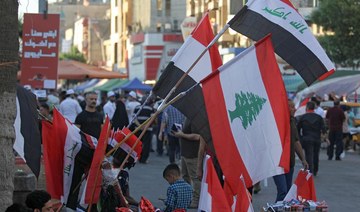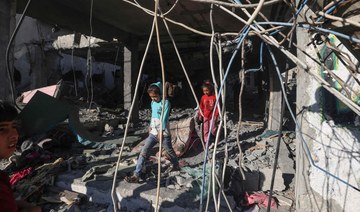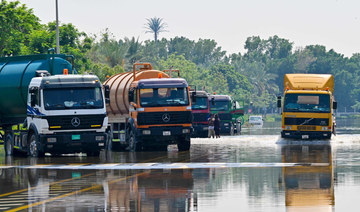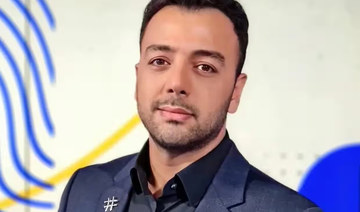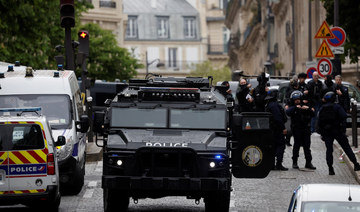BEIRUT: Draped in the Lebanese flag, 22-year-old Dana is bursting with pride at taking part in Lebanon’s “revolution” — even if her home country refuses to give her nationality.
Standing among other demonstrators in the capital, she explains she was born in Beirut to a Lebanese mother and has spent all her life in the country.
But like thousands of others in Lebanon, her father is a foreigner and, with Lebanese women unable to pass down their nationality, she has been deprived of citizenship.
“My parents divorced before I was even born. I grew up with my mother,” Dana told AFP.
“I see myself as Lebanese, but they don’t want to recognize my identity,” she added.
The politicians who do not want to change the century-old law, she says, are “patriarchal” and “racist.”
The right to citizenship is one of many long-standing demands to have found new life in the mass protests sweeping Lebanon since October 17.
The unprecedented show of cross-sectarian anger in the street brought down the government last month — but many other of the demonstrators’ demands remain unmet.
Outside the seat of government, 17-year-old Omar said he’d only ever been to Syria once, but was consistently suffering the consequences of his father’s nationality.
Each year, he has to make his way to General Security headquarters to renew his residency permit — like all other non-Lebanese.
“They treat us like foreigners. It’s humiliating,” he said, holding the Lebanese red-green-and-white flag.
Last year, Human Rights Watch (HRW) strongly denounced the law, noting that Lebanon lags far behind some other countries in the region on the issue.
Algeria, Egypt, Morocco, Tunisia and Yemen all provide equal citizenship rights to the children of both women and men, while Iraq and Mauritania confer nationality to those born in the country, according to HRW.
At a Beirut protest, Samer stood in a small crowd, raising his fist and chanting against political leaders he sees as inept and corrupt, the majority of whom have been in power since the end of the country’s 15-year civil war in 1990.
“But we need it (citizenship) to work, to sign up our children at school and receive social security,” said the 33-year-old, whose father is Palestinian and who is himself the father of three.
Despite activists campaigning to amend the 1925 nationality law, Lebanese authorities have been reluctant to do so.
In this small multiconfessional country of around 4.5 million, the political system relies on a fragile balance of power between communities.
Authorities fear that changing the law would open the door — especially through marriages of convenience — to the naturalization of some of the majority-Sunni 1.5 million Syrians and around 174,000 Palestinians living in the country, according to official estimates.
Last year, then foreign minister Gibran Bassil suggested amending the law to allow for Lebanese mothers to pass on their nationality — but only if the father was neither Palestinian nor Syrian.
“It’s racism,” said Randa Kabbani, coordinator of the “My Nationality, My Dignity” campaign demanding citizenship for children of Lebanese women.
Of the 10,000 impacted households identified by the campaign, some 60 percent are Syrian, 10 percent Egyptian, and just seven percent Palestinian, Kabbani said.
Others are Jordanian, Iraqi, American or hold European nationalities, she added.
Around 80 percent are Muslim and 20 percent Christian.
Samer said those pushing for reform are not demanding the naturalization of all Palestinians living in Lebanon, “but only those born to a Lebanese mother. It’s a natural right.”
Kabbani said she was delighted the issue had gained new momentum in the ongoing protests.
“Before the movement, women were almost ashamed to speak up about it. But today they’re clamouring loud and clear,” she said.
On Sunday, hundreds of protesters took part in a march organized by “My Nationality, My Dignity” in the capital.
Volunteers with the campaign have erected a tent in the square by the office of the now deposed cabinet to discuss the issue.
When she is not protesting, Dana — the university student — helps spread the word among other protesters so they too can join in her fight.
But the young student says she is under no illusions.
Whether or not a new cabinet includes independent experts as demanded, the key to her finally obtaining her Lebanese citizenship will boil down to political will.
“The day decent leaders take power, the legal amendment will fly through,” she said.
In their mother’s country, Lebanon protesters clamor for citizenship
In their mother’s country, Lebanon protesters clamor for citizenship
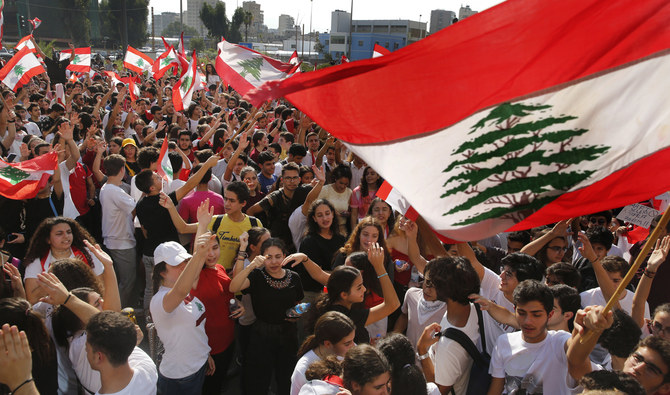
Palestinians to reconsider US ties after veto of bid for full UN membership, Abbas says
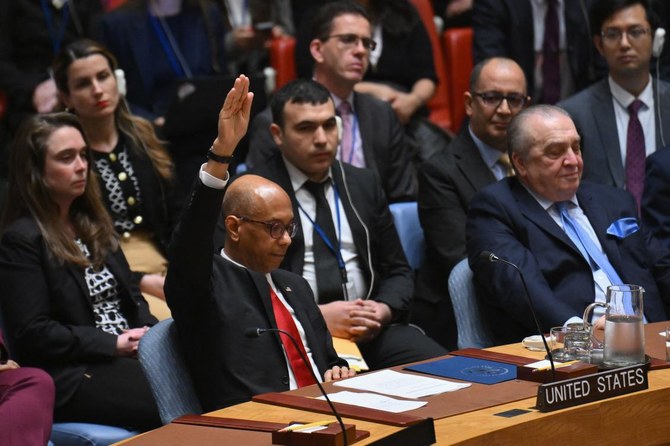
CAIRO: The Palestinian Authority will reconsider bilateral relations with the US after Washington vetoed a Palestinian request for full United Nations membership, President Mahmoud Abbas said in an interview with the official WAFA news agency.
Israel says its forces kill 10 militants in West Bank raid

- “Security forces eliminated 10 terrorists during encounters” over more than 40 hours, the army said
- Eight soldiers and a police officer had been injured in the raid
TULKARM, Palestinian Territories: The Israeli army said Saturday that its security forces killed 10 militants in an ongoing raid around Nur Shams, a refugee camp in the north of the occupied West Bank.
“Security forces eliminated 10 terrorists during encounters” over more than 40 hours, the army said in a statement.
The army said eight soldiers and a police officer had been injured in the raid.
An AFP journalist in nearby Tulkarem heard gunshots and blasts coming from Nur Shams on Saturday.
Residents contacted by AFP said there was a power outage and food was running short in the camp, saying nobody was allowed to enter or leave.
Since early last year violence has flared across the West Bank, which Israel has occupied since 1967. The violence has further escalated since the war in Gaza broke out on October 7.
Israeli forces say their frequent raids in the West Bank target Palestinian militants, but civilians are often among the dead.
Around 480 Palestinians have been killed by Israeli troops or settlers in the West Bank since the Hamas assault on Israel triggered the Gaza war, according to Palestinian official sources.
Emirates and flydubai resume normal operations after Dubai floods
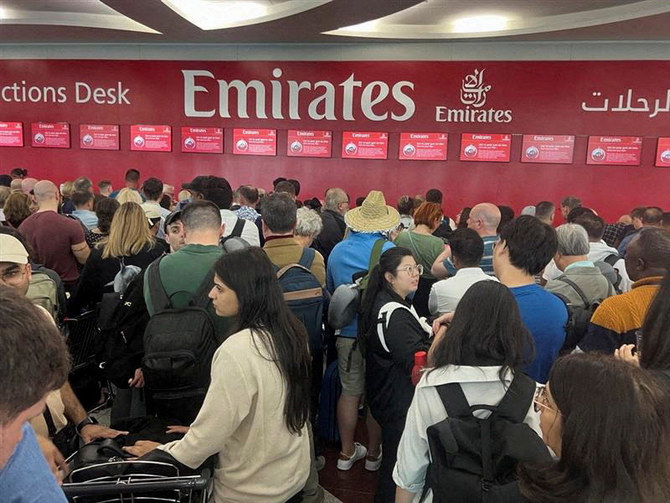
- Emirates canceled nearly 400 flights and delayed many more as a result of a record storm that hit the desert city of Dubai
RIYADH: Dubai’s flagship carrier Emirates and sister airline flydubai have restored normal operations after heavy rains caused severe flooding across the United Arab Emirates earlier this week, the airlines said on Saturday.
Emirates canceled nearly 400 flights and delayed many more as a result of a record storm that hit the desert city of Dubai on Tuesday, said a statement released by the airline’s president, Tim Clark.
Due to the impact of the storm, the airline suspended check-in for passengers departing from Dubai and halted its transit operations through Dubai International Airport, a major global travel hub, leaving thousands of travelers stranded.
The airport has struggled to return to normal operations after the storm flooded taxiways, forcing flight diversions, delays and cancelations.
Flydubai also returned to its full flight schedule from the airport’s Terminal 2 and Terminal 3 on Saturday following the weather-related disruption, a spokesperson for the airline said.
Clark said Emirates had provided 12,000 hotel rooms and 250,000 meal vouchers to customers who were affected. He added it would take days to clear the backlog of rebooked passengers.
The UAE has suffered the impact of the flooding for days, with roads between the city and Abu Dhabi still partially under water as of Saturday. In Abu Dhabi, some supermarkets and restaurants faced product shortages, unable to receive deliveries from Dubai.
Researchers have linked extreme weather events such as Tuesday’s storm to climate change and anticipate that global warming will lead to higher temperatures, increased humidity and a greater risk of flooding in parts of the Gulf region.
A lack of drainage infrastructure to cope with heavy rains in countries such as the UAE can put them at particular risk of flooding.
Israeli airstrike in Rafah kills at least 9 Palestinians, including 6 children
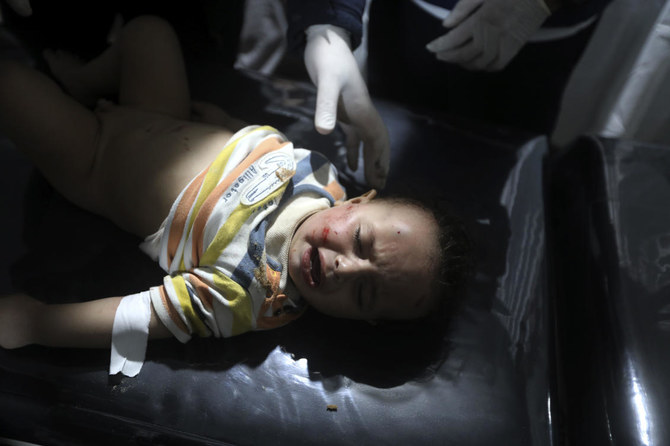
- Strike late Friday hit a residential building in the western Tel Sultan neighborhood of the city of Rafah
RAFAH, Gaza Strip: An Israeli airstrike on a house in Gaza’s southernmost city killed at least nine people, six of them children, hospital authorities said Saturday, as Israel pursued its nearly seven-month offensive in the besieged Palestinian territory.
Israel’s war against the Islamic militant group Hamas has led to a dramatic escalation of tensions in an already volatile Middle East.
The strike late Friday hit a residential building in the western Tel Sultan neighborhood of the city of Rafah, according to Gaza’s civil defense. The bodies of the six children, two women and a man were taken to Rafah’s Abu Yousef Al-Najjar hospital, the hospital’s records showed.
At the hospital, relatives cried and hugged the bodies of the children, wrapped in white shrouds, as others comforted them.
The fatalities included Abdel-Fattah Sobhi Radwan, his wife Najlaa Ahmed Aweidah and their three children, his brother-in-law Ahmed Barhoum said. Barhoum also lost his wife, Rawan Radwan, and their 5-year-old daughter Alaa.
“This is a world devoid of all human values and morals,” Barhoum told The Associated Press Saturday morning, crying as he cradled and gently rocked the body of Alaa in his arms. “They bombed a house full of displaced people, women and children. There were no martyrs but women and children.”
No victims were registered from a second overnight strike in the city.
Rafah, which lies on the border with Egypt, currently hosts more than half of Gaza’s total population of about 2.3 million people, the vast majority of whom have been displaced by fighting further north in the territory.
Despite calls for restraint from the international community, including Israel’s staunchest ally, the United States, the Israeli government has insisted for months that it intends to push a ground offensive into the city, where it says many of the remaining Hamas militants are holed up.
Such a ground operation has not materialized so far, but the Israeli military has repeatedly carried out airstrikes on and around the city.
The war was sparked by an unprecedented raid into southern Israel by Hamas and other militant groups on Oct. 7 that left about 1,200 people dead, the vast majority of them civilians, and saw about 250 people kidnapped and taken into Gaza. Israel says about 130 hostages remain in Gaza, although more than 30 have been confirmed to now be dead, either killed on Oct. 7 or having died in captivity.
The Gaza Health Ministry said Saturday the bodies of 37 people killed by Israeli strikes were brought to hospitals in Gaza over the past 24 hours. Hospitals also received 68 wounded, it said. The latest figures bring the overall Palestinian death toll from the Israel-Hamas war to at least 34,049, and the number of wounded to 76,901, the ministry said. Although the Hamas-run health authorities do not differentiate between combatants and civilians in their count, they say at least two thirds have been children and women.
The war has sent regional tensions spiraling, leading to a dramatic eruption of violence between Israel and its archenemy Iran that threatened to escalate into a full-blown war.
On Friday, both Iran and Israel played down an apparent Israeli airstrike near a major air base and nuclear site in central Iran, indicating the two sides were pulling back from what could have become an all-out conflict. Over the past several weeks, an alleged Israeli strike killed two Iranian generals at an Iranian consulate in Syria and was followed by an unprecedented Iranian missile barrage on Israel.
Israel has also faced off with the Hezbollah militant group, an Iranian proxy operating from Lebanon, with the two sides there frequently trading rocket and drone attacks across the Lebanese-Israeli border. Yemen’s Iran-backed Houthi rebels have also joined the fray, launching strikes against merchant ships in the Red Sea and the Gulf of Aden in what they say is a campaign of solidarity with the Palestinians in Gaza.
Tension has also been high in the occupied West Bank, where an Israeli military raid Friday in the Nur Shams refugee camp killed at least four Palestinians, including three militants, according to the Israeli military, Palestinian health officials and a militant group.
Palestinian health authorities said one of those killed was a 15-year-old boy shot dead by Israeli fire. The Islamic Jihad militant group confirmed the deaths of three members, including one who it said was a local military commander. The Israeli military said four Israeli soldiers were slightly wounded in the operation.
Saraya Al-Quds, the military arm of Islamic Jihad, said its fighters had engaged in heavy gunbattles Saturday morning with Israeli forces in the town of Tulkarem, adjacent to Nur Shams. No further details were immediately available. Residents in Tulkarem went went on a general strike Saturday to protest the attack on Nur Shams, with shops, restaurants and government offices all closed.
Since the Oct. 7 Hamas attack on southern Israel, more than 460 Palestinians have been killed by Israeli fire in the West Bank, Palestinian health officials say. Israel stages frequent raids into towns and cities in the volatile territory. The dead have included militants, but also stone-throwers and bystanders. Some have also been killed in attacks by Israeli settlers.
Iran FM downplays reported Israeli retaliation

- Israeli officials have made no public comment on what happened Friday
- Overnight last Saturday-Sunday Iran launched its first-ever direct attack on Israeli territory
Tehran: Iran’s foreign minister has dismissed as akin to child’s play the reported Israeli retaliation for an unprecedented Iranian strike, and said Tehran would not respond unless Iranian “interests” were targeted.
On Friday, Iran’s state media reported explosions were heard after, according to an official, small drones were successfully shot down.
Media in the United States quoted officials there as saying Israel had carried out strikes in retaliation for Tehran’s drone and missile barrage fired at Israel last weekend.
“What happened last night was no attack,” Foreign Minister Hossein Amir-Abdollahian told NBC News in a Friday interview.
“It was the flight of two or three quad-copters, which are at the level of toys that our children use in Iran.”
He added that, “As long as there is no new adventure on behalf of the Israeli regime against Iran’s interests, we will have no response.”
Friday’s explosions prompted world leaders to appeal for calm and de-escalation with fears of wider conflict against the backdrop of the war in Gaza which began on October 7.
Overnight last Saturday-Sunday Iran launched its first-ever direct attack on Israeli territory. The barrage was in response to a deadly April 1 air strike on Tehran’s consulate in Damascus, which Iran blamed on Israel.
The Israeli army said the vast majority of the more than 300 missiles and drones fired by Iran were shot down — with the help of the United States and other allies — and that the attack caused only minimal damage.
Israeli officials have made no public comment on what happened Friday, and analysts said both sides are looking to de-escalate, for now.
“If the Israeli regime intends to take another action against our interests, our next response will be immediate and to the maximum,” Amir-Abdollahian said in the interview.




